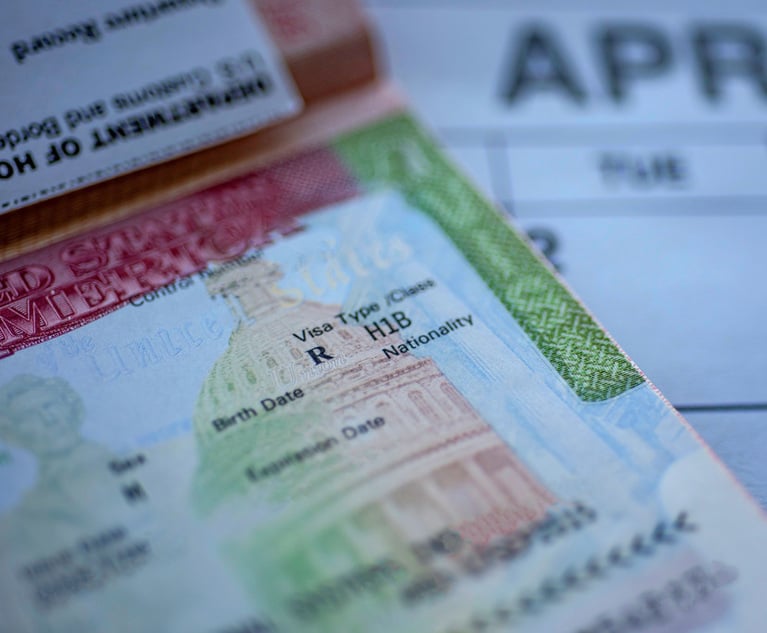Sessions Curbs Immigration Judges' Power to Close Cases
Sessions' ruling opens the door to reopening more than 350,000 immigration cases that were disposed by administrative closure, which could further inundate immigration courts facing substantial case backlogs.
May 22, 2018 at 02:31 PM
4 minute read
 U.S. Attorney General Jeff Sessions. Photo: Diego M. Radzinschi/ALM
U.S. Attorney General Jeff Sessions. Photo: Diego M. Radzinschi/ALM U.S. Attorney General Jeff Sessions has issued a decision that largely strips immigration judges of their power to dispose cases through administrative closure, a resolution to cases that judges have used in recent years to clear up their dockets.
Sessions' ruling opens the door to reopening more than 350,000 immigration cases that were disposed by administrative closure, which could further inundate immigration courts facing substantial case backlogs.
While it remains to be seen if the Department of Homeland Security will move to defrost administratively closed cases and how many cases could be affected, immigration attorneys say that Sessions' ruling may squeeze immigration courts that are already swamped with cases and negatively affect the human rights of immigrants.
Immigration judges have used administrative closures since at least the early 1980s, but Sessions said in his ruling that its use has grown “dramatically” since a 2012 ruling by the Board of Immigration Appeals made closures easier to obtain by scrapping the requirement that both parties in immigration proceedings must agree to closures.
Sessions said that closures are “effectively permanent” in most instances and that they encumber the “fair and efficient administration of immigration cases.” Following his ruling, DHS will be able to move to place an administratively closed case back on the calendar.
In a statement, Devin O'Malley, a spokesman for the Department of Justice, said the ruling eliminates the “unfettered” use of administrative closures.
“Congress never granted such broad authority to immigration judges, nor had the Attorney General delegated it,” O'Malley said. “This process—where immigration court cases were put 'out of sight, out of mind'—effectively resulted in illegal aliens remaining indefinitely in the United States without any formal legal status.”
The ruling makes an exception for instances in which administrative closure was granted as part of a settlement agreement.
“We can only hope that DHS is too busy to begin recalendaring many of these cases,” said immigration attorney Neil Weinrib of Neil A. Weinrib & Associates.
Administrative closures are generally used in three scenarios, said Hasan Shafiqullah, attorney-in-charge of the Legal Aid Society's immigration law unit: in cases in which an immigrant could be subject to removal but have “strong positive equities” in their favor, such as obtaining a green card or paying their taxes; cases where immigrants have matters pending in other courts, such as criminal court, that may have bearing on whether they are subject to removal; and cases in which DHS seeks administrative closure for an immigrant who is deemed incompetent and whose case could be permanently thrown out.
Following Sessions' ruling, Shafiqullah said he is concerned that the first category of cases may be the most vulnerable to be reopened, as prosecutorial discretion by the government in immigration cases has all but evaporated under President Donald Trump.
“Just the breadth of what he's doing is extraordinary and terrifying,” Shafiqullah said.
Jeffrey Chase, a New York City immigration lawyer who served as an immigration judge from 1995 to 2007, said Sessions' ruling takes away the power of immigration judges to “control their own dockets.”
Chase noted that the ruling comes just after the director of the immigration courts issued an edict requiring judges to complete 700 cases each year and as Sessions has indicated that he may take steps to further speed cases through the immigration courts.
Sessions has issued a ruling in another immigration case calling for parties to file briefs on what circumstances must be present for an immigration judge to have good cause to grant a continuance in the case.
“They're going to have to deport everyone in a quicker succession,” Chase said. “I think that's the end goal.”
This content has been archived. It is available through our partners, LexisNexis® and Bloomberg Law.
To view this content, please continue to their sites.
Not a Lexis Subscriber?
Subscribe Now
Not a Bloomberg Law Subscriber?
Subscribe Now
NOT FOR REPRINT
© 2025 ALM Global, LLC, All Rights Reserved. Request academic re-use from www.copyright.com. All other uses, submit a request to [email protected]. For more information visit Asset & Logo Licensing.
You Might Like
View All
Law Firms Expand Scope of Immigration Expertise Amid Blitz of Trump Orders
6 minute read
Workers' Attempt to Link H-1B Hiring to Tax Fraud Falls Short With 2nd Circuit
3 minute read
'Where Were the Lawyers?' Judge Blocks Trump's Birthright Citizenship Order
3 minute read
Hours After Trump Takes Office, Democratic AGs Target Birthright Citizenship Order
4 minute readTrending Stories
- 1ACC CLO Survey Waves Warning Flags for Boards
- 2States Accuse Trump of Thwarting Court's Funding Restoration Order
- 3Microsoft Becomes Latest Tech Company to Face Claims of Stealing Marketing Commissions From Influencers
- 4Coral Gables Attorney Busted for Stalking Lawyer
- 5Trump's DOJ Delays Releasing Jan. 6 FBI Agents List Under Consent Order
Who Got The Work
J. Brugh Lower of Gibbons has entered an appearance for industrial equipment supplier Devco Corporation in a pending trademark infringement lawsuit. The suit, accusing the defendant of selling knock-off Graco products, was filed Dec. 18 in New Jersey District Court by Rivkin Radler on behalf of Graco Inc. and Graco Minnesota. The case, assigned to U.S. District Judge Zahid N. Quraishi, is 3:24-cv-11294, Graco Inc. et al v. Devco Corporation.
Who Got The Work
Rebecca Maller-Stein and Kent A. Yalowitz of Arnold & Porter Kaye Scholer have entered their appearances for Hanaco Venture Capital and its executives, Lior Prosor and David Frankel, in a pending securities lawsuit. The action, filed on Dec. 24 in New York Southern District Court by Zell, Aron & Co. on behalf of Goldeneye Advisors, accuses the defendants of negligently and fraudulently managing the plaintiff's $1 million investment. The case, assigned to U.S. District Judge Vernon S. Broderick, is 1:24-cv-09918, Goldeneye Advisors, LLC v. Hanaco Venture Capital, Ltd. et al.
Who Got The Work
Attorneys from A&O Shearman has stepped in as defense counsel for Toronto-Dominion Bank and other defendants in a pending securities class action. The suit, filed Dec. 11 in New York Southern District Court by Bleichmar Fonti & Auld, accuses the defendants of concealing the bank's 'pervasive' deficiencies in regards to its compliance with the Bank Secrecy Act and the quality of its anti-money laundering controls. The case, assigned to U.S. District Judge Arun Subramanian, is 1:24-cv-09445, Gonzalez v. The Toronto-Dominion Bank et al.
Who Got The Work
Crown Castle International, a Pennsylvania company providing shared communications infrastructure, has turned to Luke D. Wolf of Gordon Rees Scully Mansukhani to fend off a pending breach-of-contract lawsuit. The court action, filed Nov. 25 in Michigan Eastern District Court by Hooper Hathaway PC on behalf of The Town Residences LLC, accuses Crown Castle of failing to transfer approximately $30,000 in utility payments from T-Mobile in breach of a roof-top lease and assignment agreement. The case, assigned to U.S. District Judge Susan K. Declercq, is 2:24-cv-13131, The Town Residences LLC v. T-Mobile US, Inc. et al.
Who Got The Work
Wilfred P. Coronato and Daniel M. Schwartz of McCarter & English have stepped in as defense counsel to Electrolux Home Products Inc. in a pending product liability lawsuit. The court action, filed Nov. 26 in New York Eastern District Court by Poulos Lopiccolo PC and Nagel Rice LLP on behalf of David Stern, alleges that the defendant's refrigerators’ drawers and shelving repeatedly break and fall apart within months after purchase. The case, assigned to U.S. District Judge Joan M. Azrack, is 2:24-cv-08204, Stern v. Electrolux Home Products, Inc.
Featured Firms
Law Offices of Gary Martin Hays & Associates, P.C.
(470) 294-1674
Law Offices of Mark E. Salomone
(857) 444-6468
Smith & Hassler
(713) 739-1250






